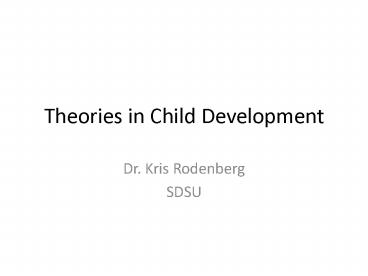Theories in Child Development - PowerPoint PPT Presentation
1 / 20
Title:
Theories in Child Development
Description:
... Office Theme 1_Office Theme 2_Office Theme 3_Office Theme Theories in Child Development Slide 2 Slide 3 Slide 4 Arnold Gesell - 1880-1961 Sigmund Freud ... – PowerPoint PPT presentation
Number of Views:118
Avg rating:3.0/5.0
Title: Theories in Child Development
1
Theories in Child Development
- Dr. Kris Rodenberg
- SDSU
2
Is development continuous, or does it occur in
stages?
3
Shift from early studies to today
- A Shifting Balance
- Early theorists favored organismic or stage
approaches - Today attention is focused on the biological and
evolutionary bases of behavior in tandem - Bidirectional people change their world as it
changes them (consider Bronfrenbrenners
bioecological framework)
4
Research Methods
- Quantitative
- Based on scientific method
- 1. Identify a problem
- 2. Formulate hypotheses
- 3. Collect data
- 4. Analyze the data
- 5. Disseminate findings
- Qualitative
- Open-ended
5
Arnold Gesell - 1880-1961
Main points Physical and basic skill development
is genetically determined by universal
maturation patterns that occur in a predictable
sequence.
Nature
Nurture
6
Sigmund Freud - 1857-1939
Main points Experiences in early childhood
influence later development. Assumes sexual
factors are major components in psychosocial
development Often called The Father of
Psychoanalysis, he believed that our deepest
thoughts were often revealed in symbols.
Nature
Nurture
7
Freuds Psychoanalytic Theory
- Id / Ego / Superego
- Oral?Anal?Phallic
- Oedipal complex
- Electra complex
- Latency
- Repression
- Sublimation
- Fixation
- Regression
8
Erik Erikson - 1902-1994
Main points Student of Freud. He experienced
identity confusion and proposed 8 stages of
psychosocial development from birth to death.
Each stage is represented by resolution of a
conflict -- __ versus ___.Believed that
environment acted on ones innate disposition.
Nature
Nurture
9
Edward Thorndike 1874-1949
- Law of effect? Stimulus Response
- Law of exercise (practice Reinforcement)
- Transfer of learning
- Operant conditioning (cats)
10
B.F.Skinner - 1904-1990
Main points Student of Thorndike (S/R theory
w/cats) and lab partner of Pavlov (dogs) if you
can train an animal, you can train a
child. Reinforcement and punishment shapes
behavior. Children are conditioned by their
experiences, no matter what they are born with.
Nature
Nurture
11
Skinnerian Discipline
12
Albert Bandura - 1925-present
Learning takes place via imitation. The Bobo
Doll experiments. Differs from Skinners
conditioning emphases on inner motivational
factors. Proponent of observational theory which
is key in social constructivism.
Nature
Nurture
13
Lev Vygotsky - 1896-1934
- Development is primarily driven by language
acquisition (ability to communicate), social
contexts, and adult/experienced person guidance.
Children learn through social interaction. - Private speech ? internal speech
- Zone of Proximal Development
- Independent/instructional/
- Frustration levels
- Scaffolding
- Foundation of Gradual Release Theory
Nature
Nurture
14
Jean Piaget - 1896-1980
Distinct cognitive stages affect ones ability to
make sense of the world. Adults influence, but
children build, or construct, their own
thinking systems (schema). Also, identified
shifts in moral development from egocentric to
altruistic as a component of psychosocial
development.
Nature
Nurture
15
Carl Rogers 1902-1987
- Client-centered therapy morphs to
student-centered classroom - Self-actualization tendency (part of human
nature) drives capacity building linked to
motivation - Active Listening by instructor and development
of metacognition (self-monitoring) shape who we
are and how we learn I messages
16
Jerome Brunner 1915 --
- An anti-stage theorist, he support social
constructivist theory. - Humans learn via categorization of knowledge.
Likes Vygotskys ideas about the role of speech
and language in constructing meaning BUT in a
sequence from enactive (action) - to iconic
(image) - to symbolic (language) representations.
- Believes that we can learn anything as long as it
is sequenced appropriately.
17
Benjamin Bloom 1913-1999
- Developed a taxonomic hierarchy of
cognitive-driven behavior deemed important to
learning and to measurable capability. - Believed in learning for mastery and that ones
perceptions of mastery affect ones attitude
toward learning (leads to motivation and
engagement).
18
Abraham Maslow 1900-1970
- Founder of Humanistic Psychology
- Hierarchy of human needs
- Humans are intrinsically curious
19
(No Transcript)
20
Have we forgotten anyone?
- Of course! There are many other researchers and
theorists who have shaped our understanding of
why we do what we do in classrooms and have
linked this knowledge with understanding our
students psychosocial development. - But these are key theories/theorists































